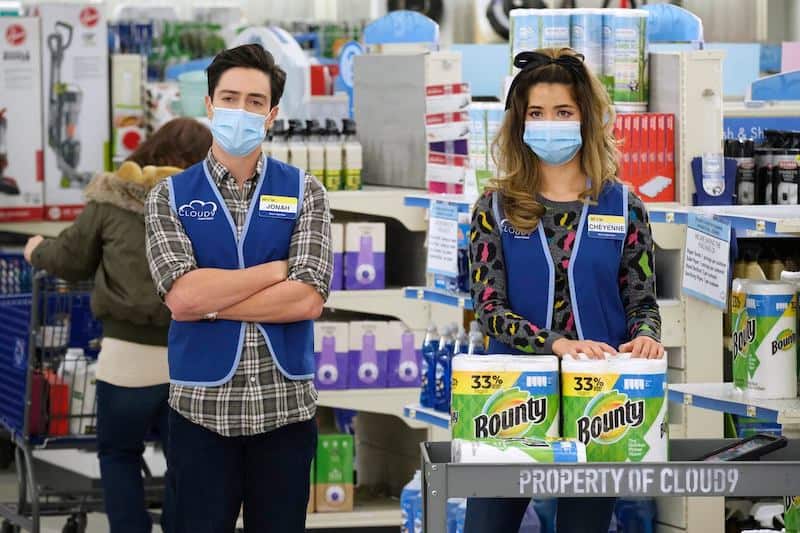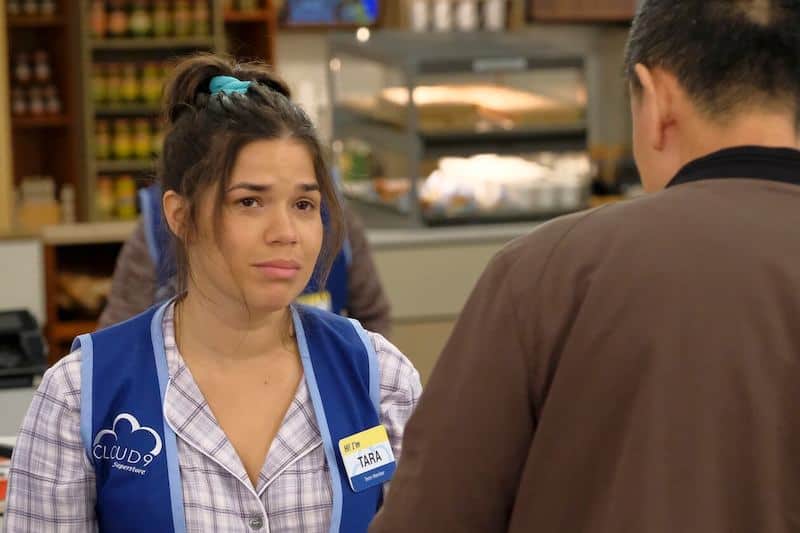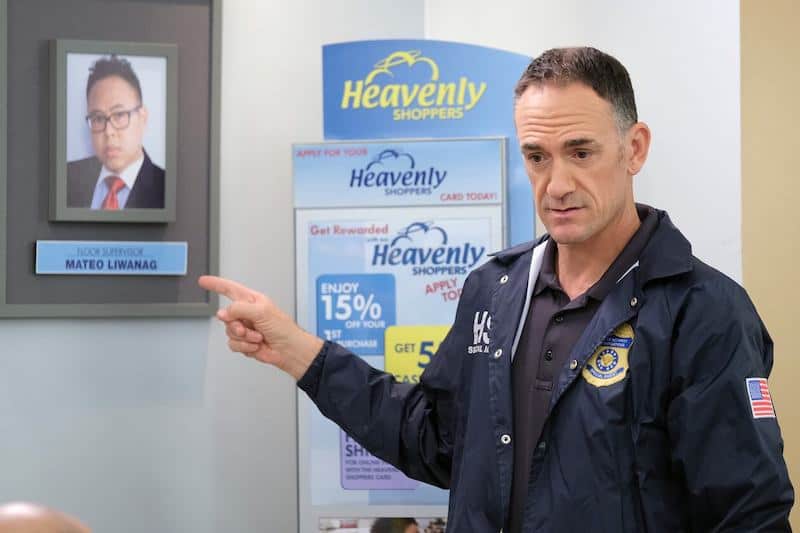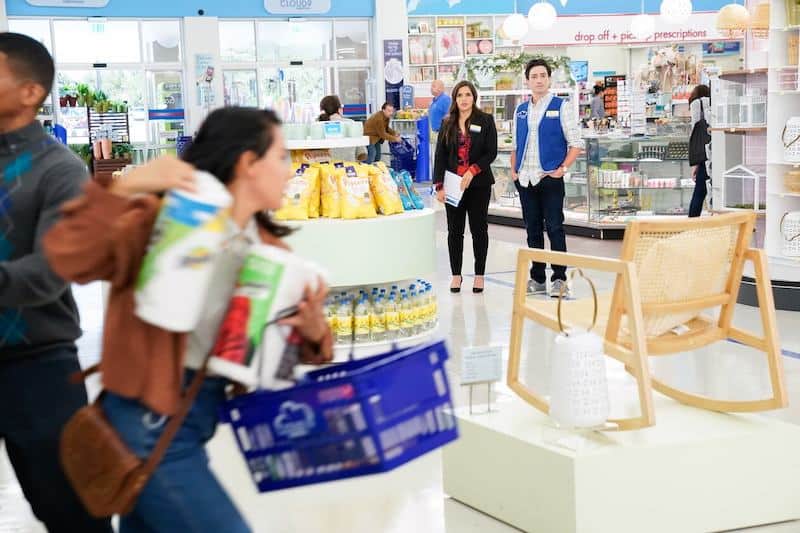
Season 4, Episodes 5 and 6: “Delivery Day” and “Maternity Leave”

In these two episodes, twin pregnancy storylines for Amy and Dina (Lauren Ash) come together as both women get set to deliver — Amy because her water broke and Dina because she’s inducing. Amy is pregnant with her second child, and Dina is acting as a surrogate for Glenn and his wife.
In “Delivery Day,” they get to the hospital, and Amy feels the limits of the company’s health insurance policy while Dina benefits from the superior insurance Glenn is offered as the store manager. Amy is informed she’ll have to pay out of pocket for a hospital room that costs $2,000 per night in addition to other fees for lab costs and anesthesia, or she can go to a nearby clinic that will accept her insurance.
Amy, of course, ends up giving birth to her son at the overcrowded clinic. The show exaggerates the disparities between the two locations — Amy’s bed blanket has a used bandage on it, and the patient in the bed next to hers is almost certainly dead, while Dina luxuriates in a well-lit fully-equipped hospital full of McDreamy doctors. But while the exaggeration makes for great comedy, it’s also a statement about how unfair it is that two women doing the exact same thing — giving birth — can experience such a gross disparity in treatment because corporate has the right to decide who gets insurance coverage and what kind of coverage they get.
In the next episode, “Maternity Leave,” Amy learns that corporate has canceled her maternity leave (see episode 1×11), so she is due back at work two days after giving birth, sleepless, lactating, physically exhausted, and fuming with rage about the situation. That the show spends time on this storyline over a series of episodes is evidence of the importance it is assigning the topic.
Unlike other sitcoms where the joke may be on the mom — pregnancy brain and weird food cravings are the usual go-to storylines for pregnant TV characters — on Superstore, the jokes come at the expense of corporate America and the broken healthcare system.
Mid-shift Glenn approaches a bone-tired Amy with a bath bomb as a consolation gift for having to be at work, and she finally explodes into a rant that manages to be both heartbreaking and really funny. “I have slept ninety minutes in three days. The lining of my uterus is coming out in clumps. I have hemorrhoids so big that my doctor looked at my a**hole and said, “Whoa!” Have you ever had a doctor look at your a**hole and say that?”
Amy is a working mom like so many Americans. Her plight is not unique, but it is rarely shown so truthfully and empathetically on screen. Dina, meanwhile, was shown making a different but equally valid birthing choice, and her body and the decisions she makes with it were never judged by her peers or by the show. Both Amy’s pregnancy and Dina’s surrogacy storyline are emblematic of what Superstore does best: take on an important subject we think we know, but from an angle that we normally don’t see or consider.
Season 4, Episode 22: “Employee Appreciation Day”

The immigration arc involving Mateo’s (Nico Santos) is one of the most poignant in the series, and it comes to a head in the Season 4 finale, titled “Employee Appreciation Day” (a nice zinger from Jonah: “It’s weird how Employee Appreciation Day always seems to fall right around when people are filling out their union cards”). We learn early on that Mateo, a Filipino employee, is hiding his undocumented status from corporate, correctly fearing that he’ll be deported.
Jeff, Mateo’s ex learns that corporate is sending ICE to the store to scare employees who are trying to unionize. He gives Amy the heads up that Mateo needs to scram, prompting this hilariously layered exchange between Amy and Glenn:
Amy: Mateo! Mateo! ICE is coming!
Glenn: Isn’t it “winter is coming?”
The employees all figure out that they’ve individually been carrying Mateo’s secret from each other to protect him, which is as sweet as it is funny, and they start throwing out hail mary ideas to help Mateo avert detention (“What if we hide him on the roof? In the trash compactor full of broken mannequins?”). Sayid (Amir M. Korangy), another immigrant employee, distracts an ICE agent by showing him a detailed binder full of his immigration paperwork: “Here are pictures of me at the block party in my mostly white neighborhood. As you can see, everybody’s smiling.”
In a moving final sequence, Dina, the biggest stickler, uses the store surveillance system to frantically help Mateo jump aisles to avoid ICE agents scouring the store looking for him. The episode ends with him being captured and the reality of the stakes crushing down on the Cloud 9 employees as the entire store watches him get carted off in a van marked “Homeland Security.” It’s the most gutting finale the show has ever done.
“Employee Appreciation Day” aired in May 2019, the same day as news came out that, in the hopes of cracking down on workers without legal status, the Trump Administration sent out “no-match letters” to more than half a million employers suggesting their employees’ names and Social Security numbers might not align.
Exploring Mateo’s undocumented status wasn’t a “Very Special Episode” of the show. It was a thread woven into storylines across multiple seasons to give a grounded look at a situation faced by millions of undocumented residents of America. That the writers were able to land any comedic beats in this episode is a testament to their prowess at the highwire act of producing sharp but not pedantic television.
Season 6, Episode 1: “Essential”

When COVID-19 hit and television shows wrestled with how to continue production let alone how to incorporate the pandemic into compelling storylines, top TV critics Matt Zoller Seitz and Kevin Fallon noted that Superstore was the only show that could be trusted to deliver a good COVID-19 episode.
This became abundantly clear as pandemic-storylines started rolling in, and TV shows got flagged for improper mask usage and viewers grew tired of seeing coronavirus plots on-screen while experiencing COVID-19 IRL. Medical shows went for melodramatic doctor-centric storylines, accurately if unimaginatively painting portraits of medical workers as the heroes they are on- and off-screen. Their approach was understandable, but given how often disaster and trauma visit on-screen medical professionals, COVID-19 plots felt like more of the same.
By contrast, in the Season 6 premiere of Superstore, titled “Essential,” the Cloud 9 employees are newly minted “essential workers.” Unlike doctors, who are highly regarded off-screen, minimum-wage-earning employees, like those at Cloud 9, are not used to being called heroes. The episode plays on that tension perfectly.
Vulture critic Kathryn VanArendonk explains why in a piece called “Superstore is the Only Show I Trust to Tell a Coronavirus Story”: “More than any show currently on TV, I trust Superstore to deal with an unprecedented story about safety and the economy and massive wealth disparity and the bitter unfairness of essential workers’ being treated like replaceable subhuman machine parts, because unlike any other TV show on right now, Superstore has the receipts.”
The COVID-19 plot in Superstore is about demonstrating what it means to be the least compensated, least protected, and most-needed workers in a deadly pandemic. It’s like experiencing the “Black Friday” episode as a time loop with the difficulty dialed up to 100. Cloud 9 workers are stuck trying to decipher vague safety guidelines from corporate, which is also being stingy with PPE, dealing with item shortages as customers selfishly stock up on essential goods, anti-maskers threatening their lives in-store, and the fatigue of encountering these same problems every day for months — the episode employs time jumps to cover several months of the quarantine.
And, because Superstore is so dialed-in, there is also an inclusion of 2020’s other big event, the global Black Lives Matter protests, in the most Superstore way possible: Zephra (a.k.a. corporate), sends over cheesy “Zephra Believes in the Black Community” signs for the store, and Garrett, a Black employee, glibly asks, “What are we, ghosts?”
Unlike other canceled-too-soon shows, Superstore was not “ahead of its time.” It was right on time. No comedy does a better job addressing the present moment than Superstore. So whether it’s the glut of options scattering viewer attention or a network misreading the zeitgeist, the sad truth is we are losing a show we desperately need.
Superstore flashed the mega-watt spotlight of primetime television on people whom our society doesn’t see as heroes, and it argued why we should. As labor rights issues such as the fight to raise the minimum wage, push back against the gig economy, and find a pathway for affordable healthcare enter the national discourse, the importance of a show that lets us follow characters whose lives will be directly impacted by these changes cannot be overstated. It’s not the kind of show that should be canceled; it’s the kind of show that should be replicated.
The Superstore finale hasn’t even aired yet, but I already miss this show.
Related Topics: Comedy, Sitcoms, superstore, TV

